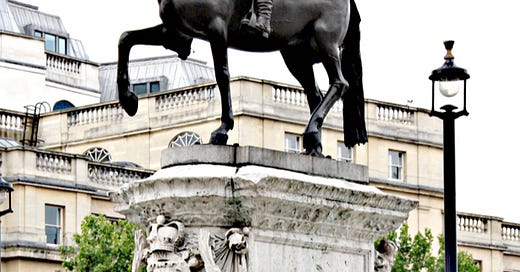Shrewd
If only I had a little more of a John Rivett in me, I sometimes think, then it would all be fine. That’s at least in terms of money. Rivett was a shrewd businessman. It’s true, he was not completely straight, but integrity is generally not the most dominate virtue of one who is shrewd.
Oh, you don’t know John Rivett? He was the man who bought the statue of King Charles I in 1649. This is the statue that now stands in Trafalgar Square, at the top of Whitehall, looking towards the Houses of Parliament. Although I’d say Charles is actually looking (somewhat sadly) halfway up Whitehall towards the Banquet Hall. It was there that he was beheaded on 30 January 1649.
It was all the result of the English Civil War when parliament (read dictator Oliver Cromwell) took over from the Stuart king. It cost the king his head and John Rivett a tidy sum to buy his statue. He was ordered to destroy the statue and then could sell the melted copper to anyone he wanted.
Rivett had a better plan. He hid the king on his horse in one of his stables. Then he bought some copper and had knives, scissors and thimbles made from it. He sold these as memorabilia of the decapitated king. They were very much sought after. Royalists cherished their copper souvenirs of their beloved king. However, the parliamentarians saw them as tangible evidence of their victory over a hated royal family.
In 1660, the royal order was restored in England and Charles II ascended the throne. It was some time before he discovered that his father’s statue still existed. He was delighted. He bought the statue back from Rivett (reportedly for a considerably higher price than Rivett had paid for it) and placed it in its present location on a plinth designed by Christopher Wren (St Paul’s Cathedral) that same year.
Not everyone was happy with Rivett's behavior. Questions were asked in the House of Lords and they demanded that Rivett be immediately throw in jail. If that couldn’t happen, he should at least return his profits to the state. Nobody was listening. The parliament was simply not held in very high esteem after the disastrous years under Cromwell.
That did not apply to Rivett, whose name is still pronounced with some respect. According to some, the word riveting – compelling, great – is derived from his name. There is not complete agreement on that, but I consider the story of the never-melted statue a riveting story.




